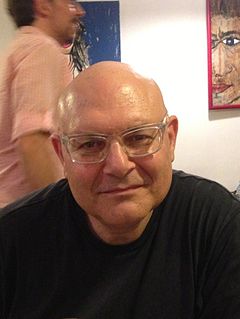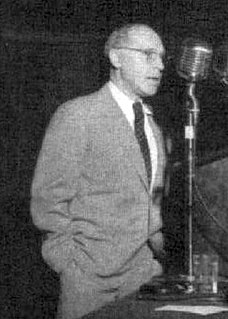A Quote by Ferdinand de Saussure
It is only since linguistics has become more aware of its object of study, i.e. perceives the whole extent of it, that it is evident that this science can make a contribution to a range of studies that will be of interest to almost anyone.
Related Quotes
The object is evident in the name of the discipline. Similarly, theology (theologia) is the study of God. The object of theology is not the church's teaching or the experience of pious souls. It is not a subset of ethics, religious studies, cultural anthropology, or psychology. God is the object of this discipline.
Ever since the beginning of modern science, the best minds have recognized that "the range of acknowledged ignorance will grow with the advance of science." Unfortunately, the popular effect of this scientific advance has been a belief, seemingly shared by many scientists, that the range of our ignorance is steadily diminishing and that we can therefore aim at more comprehensive and deliberate control of all human activities. It is for this reason that those intoxicated by the advance of knowledge so often become the enemies of freedom.
Just to the extent that the Bible was appealed to in matters of science, science was retarded; and just to the extent that science has been appealed to in matters of religion, religion has advanced - so that now the object of intelligent religionists is to adopt a creed that will bear the test and criticism of science.
I don't have any choice any more. I am in a choiceless awareness. I don't have to be aware. I am simply aware. Now it is just like my heartbeat or like my breathing. Even if I try not to be aware, it is not possible; the very effort will make me more aware. Awareness is not a quality, a characteristic; it is your whole being. When you become aware, there is no choice left to be otherwise.
General editors' preface The growth of translation studies as a separate discipline is a success story of the 1980s. The subject has developed in many parts of the world and is clearly destined to continue developing well into the twenty-first century. Translation studies brings together work in a wide variety of fields, including linguistics, literary study, history, anthropology, psychology, and economics. This series of books will reflect the breadth of work in translation studies and will enable readers to share in the exciting new developments that are taking place at the present time.
Consumption is the sole end and purpose of all production; and the interest of the producer ought to be attended to only so far as it may be necessary for promoting that of the consumer. The maxim is so perfectly self-evident that it would be absurd to attempt to prove it. But in the mercantile system the interest of the consumer is almost constantly sacrificed to that of the producer; and it seems to consider production, and not consumption, as the ultimate end and object of all industry and commerce.
As science is more and more subject to grave misuse as well as to use for human benefit it has also become the scientist's responsibility to become aware of the social relations and applications of his subject, and to exert his influence in such a direction as will result in the best applications of the findings in his own and related fields. Thus he must help in educating the public, in the broad sense, and this means first educating himself, not only in science but in regard to the great issues confronting mankind today.
Men sometimes speak as if the study of the classics would at length make way for more modern and practical studies; but the adventurous student will always study classics, in whatever language they may be written and however ancient they may be. For what are the classics but the noblest recorded thoughts of man?... We might as well omit to study Nature because she is old.
If I have put the case of science at all correctly, the reader will have recognised that modern science does much more than demand that it shall be left in undisturbed possession of what the theologian and metaphysician please to term its 'legitimate field'. It claims that the whole range of phenomena, mental as well as physical-the entire universe-is its field. It asserts that the scientific method is the sole gateway to the whole region of knowledge.
One can truly say that the irresistible progress of natural science since the time of Galileo has made its first halt before the study of the higher parts of the brain, the organ of the most complicated relations of the animal to the external world. And it seems, and not without reason, that now is the really critical moment for natural science; for the brain, in its highest complexity-the human brain-which created and creates natural science, itself becomes the object of this science.
In fact, I don't advocate any particular diet for anyone. I think that's a very personal decision that people have to make. I will say this, however: There are more and more studies in terms of the health benefits of veganism; there are more and more studies that are showing that a properly executed vegan diet is highly beneficial for cleansing, for detoxing, in addition to lowering the risks for and even ameliorating chronic illness. We all have our own body constitutions and cultural food ways and personal tastes that determine what will work for us.



































